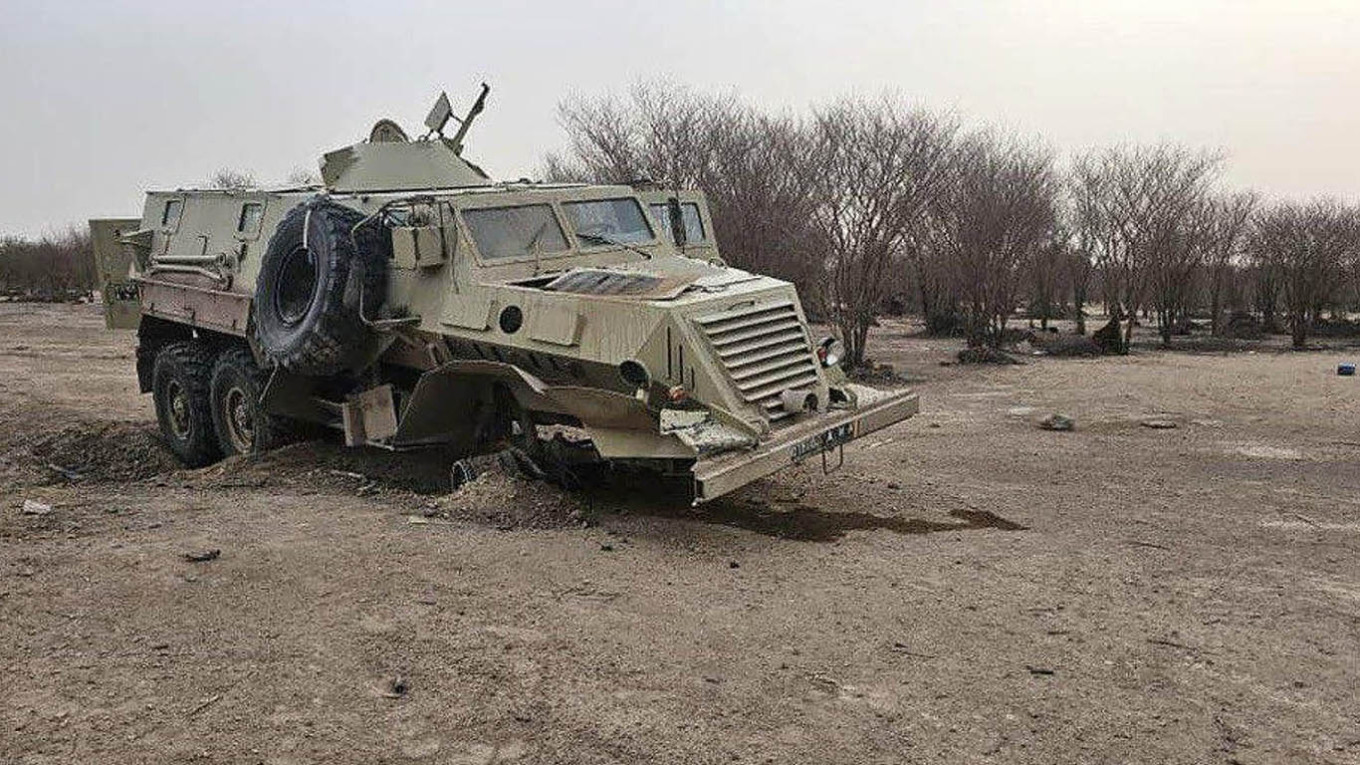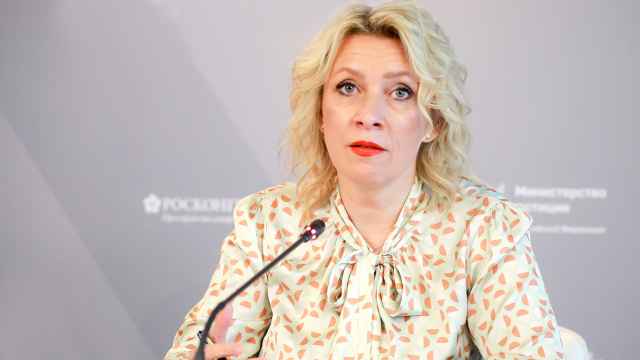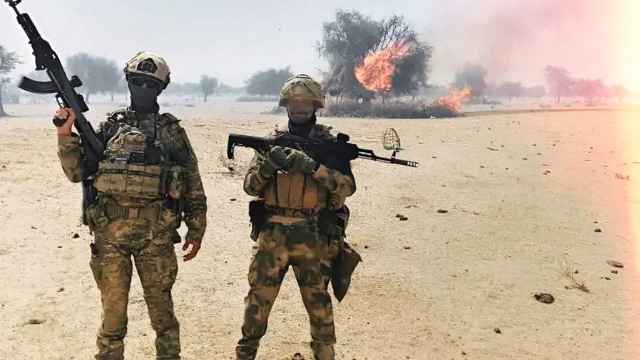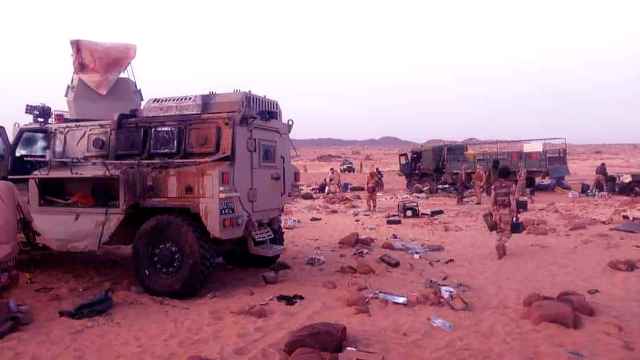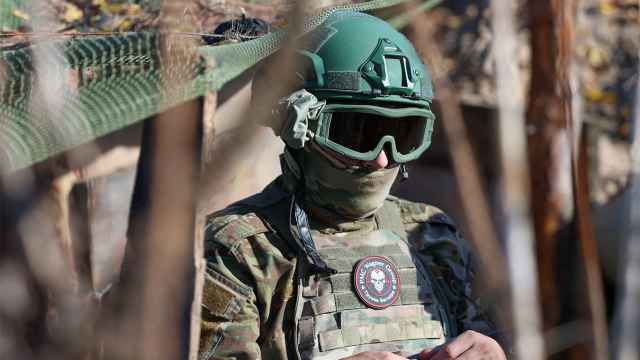On July 27 the primarily Tuareg irredentist armed group (CSP) and al-Qaeda-linked jihadists (JNIM) ambushed a Wagner Group convoy near Tinzaoutene in northern Mali, which the CSP claimed killed 84 Wagner and 47 soldiers from the Malian Armed Forces. If confirmed — and the numbers appear fairly accurate — the loss would be Wagner’s largest to date in Africa, and may even rival losses suffered against the U.S. military in Syria’s Battle of Khasham.
Whatever the final tally, there is little doubt even internally that Wagner suffered a significant defeat. But Western analysts have been too quick to cast events at Tinzaouatene as indicative that Russia’s practice of exporting mercenaries to Africa has been a failure. The West, and African governments and Russia have long retreated to separate echo chambers, using separate metrics to judge an intervention’s success. As a result, Western experts and journalists are consistently baffled each time an African government chooses to partner with Moscow.
Broadly speaking, the relationship between Yevgeny Prigozhin’s Wagner Group and the Russian state in any given country depended on that theatre’s perceived importance to Moscow’s national security. The critical importance of protecting Russia’s “near abroad” and returning to the Middle East was reflected in close ties between Wagner and the Defense Ministry in Ukraine and Syria.
In sub-Saharan Africa, however, the Defense Ministry’s footprint was considerably lighter, giving Prigozhin more freedom to pursue personal projects as he saw fit. If in Ukraine Wagner was a tool for Russian interests, in Africa Wagner worked to create just what Russia’s interests were. In the Central African Republic (CAR), for example, Wagner’s role grew from that of a fairly standard Western private military company (PMC) training the country’s security forces in early 2018, to an entity engaged in military operations, diplomacy, business, and culture only four years later.
For example, Wagner played a major role in bringing the government of the Central African Republic and fourteen armed groups to sign the 2019 Khartoum Agreement. When six of the signatories formed a new rebel alliance (CPC) and attacked the capital Bangui in January 2021, Wagner’s mission restructured from instruction to counterinsurgency.
In 2021 and 2022 Central African Armed Forces (FACA), backed by Wagner, launched a counteroffensive against the CPC that saw most major towns return to government control. Western analysts’ focus on the counteroffensive’s brutality, while merited, made it appear unsuccessful. Among Central Africans, however, the defeat of armed groups and the restoration of territorial integrity was broadly — though certainly not entirely — popular.
That success was not lost on other African capitals. A few months earlier, amid protests in the capital, Bamako, members of Malian security forces had overthrown the president and established a political transition, the National Council for the Safeguard of the Fatherland (CNSP). The CNSP maintained its partners from Operation Barkhane, a French-led counterterrorism operation. But when internal tensions sparked another coup, diplomatic relations with France soured.
The roots of one of Bamako’s main frustrations with France lie in 2012, when separatist Tuareg armed groups (MNLA) fighting for an independent state in northern Mali, Azawad, launched a rebellion. The MNLA allied with Al-Qaeda in the Islamic Maghreb (AQIM) and local jihadi movements to push out the Malian military, but once they took the north the jihadists ousted the MNLA from major towns and cities. When the jihadists turned south the transitional government in Bamako requested French military intervention.
What became a French-led regional counter-terrorism operation, Opération Barkhane, was effective at assassinating jihadi commanders. But the French infuriated Bamako — and many Malians — when they partnered with the MNLA against jihadists and blocked the Malian military from entering the captured city of Kidal. The war also moved to central Mali, where it masked essentially an ethnic conflict with spiraling violence and massacres.
Following the second coup in 2020, tensions with France reached a head and in early 2021, members of the CNSP began discussions with Russian military advisors stationed in the country. Those advisors were well aware of the gaps between Barkhane and Bamako, and they brought Prigozhin’s representatives into the mix. Together, the Russians pitched Interim President Assimi Goïta an alternative counterinsurgency operation, with Kidal at the mission’s center.
Wagner touched down in late 2021, leading to France’s departure. Western analysts had difficulty understanding what attracted Malian officers to Wagner, because all media reporting from CAR had painted the Russian intervention as a failure. A narrative had developed that only African autocracies that were willing to sign away resources in return for praetorian guards would partner with the Russian private military contractor.
The problem with this narrative was that there was an exception to each claim. Wagner had partnered with an autocrat in Sudan, but also democratically-elected governments in CAR, Mozambique, and Madagascar. Wagner did not sign resource deals in every country, and linking resource concessions to security provision is a fairly common practice in Africa anyway which can be advantageous to the local government outsourcing investment costs. Wagner provided presidential protection in only one country, to Central African President Faustin-Archange Touadéra.
When Wagner deployed to Mali, analysts quickly focused on human rights abuses and jihadist gains in the center of the country following the departure of Barkhane and a UN peacekeeping mission. They overlooked that Goïta’s circle had hired Wagner to take Kidal from the Tuareg separatists.
In October 2023 — only two months after Prigozhin’s death — Malian forces backed by Wagner launched an operation to take the country’s north. Though brutal images shared on social media should have made Tuaregs’ departure unsurprising, the capture of an abandoned Kidal took even the offensive’s participants aback. That said, Tuareg society is hardly monolithic and several clans came to Bamako’s side.
The West underestimated the extent to which Mali’s symbolic victory at Kidal could reinvigorate the regime’s popularity in Bamako and pave the way for future Russian interventions in the Sahel. However, the quick victory in Kidalalso led Bamako and Wagner to underestimate the Tuareg separatists.
Wagner’s routing at Tinzaouatene has sparked fierce criticism from Russia’s military blogger community, not least because one of its most famous denizens, Nikita Fedyanin — the administrator of the GreyZone Telegram channel — was killed in the ambush. Criticism of Wagner’s new leadership was already widespread, and the clear failure on Mali’s border with Algeria has only added fuel to the fire.
Still, painting Tinzaouatene as emblematic of Wagner’s overall failure in the Sahel will prove prescient only if Moscow decides to pack its bags. One of Wagner’s main selling points to African governments was its willingness to put its own men at risk. France lost a total of 59 soldiers in Mali over nine years. Wagner lost more than that in a day. If Moscow chooses to invest further in the conflict, as many in Russia are calling for, it will surprise many in the West by showing Sahelian governments that Russia still sees value in its involvement, whatever the cost.
A Message from The Moscow Times:
Dear readers,
We are facing unprecedented challenges. Russia's Prosecutor General's Office has designated The Moscow Times as an "undesirable" organization, criminalizing our work and putting our staff at risk of prosecution. This follows our earlier unjust labeling as a "foreign agent."
These actions are direct attempts to silence independent journalism in Russia. The authorities claim our work "discredits the decisions of the Russian leadership." We see things differently: we strive to provide accurate, unbiased reporting on Russia.
We, the journalists of The Moscow Times, refuse to be silenced. But to continue our work, we need your help.
Your support, no matter how small, makes a world of difference. If you can, please support us monthly starting from just $2. It's quick to set up, and every contribution makes a significant impact.
By supporting The Moscow Times, you're defending open, independent journalism in the face of repression. Thank you for standing with us.
Remind me later.



